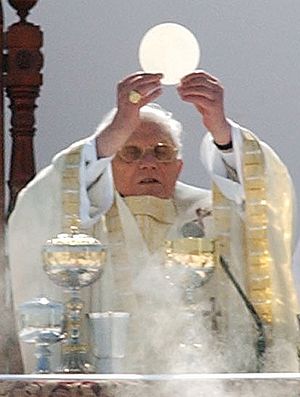Recently in Vatican II Category
In the presence of hundreds of bishops, the Eastern Catholic Patriarchs, ecumenical partners and laity, Pope Benedict prayed the Mass and preached on the meaning of both the Second Vatican Council and the Year of Faith through the lens of conversion. Benedict is clear: the Year of Faith is not celebrating the 50th anniversary of the Second Vatican Council. The Church needs not a special forum for this anniversary; it is all an invitation to conversion and to deepen one's faith in the Christ. The homily Pope Benedict delivered today follows.
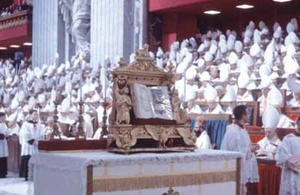
Today, fifty years from the opening of the Second Vatican Ecumenical Council, we begin with great joy the Year of Faith. I am delighted to greet all of you, particularly His Holiness Bartholomaois I, Patriarch of Constantinople, and His Grace Rowan Williams, Archbishop of Canterbury. A special greeting goes to the Patriarchs and Major Archbishops of the Eastern Catholic Churches, and to the Presidents of the Bishops' Conferences. In order to evoke the Council, which some present had the grace to experience for themselves - and I greet them with particular affection - this celebration has been enriched by several special signs: the opening procession, intended to recall the memorable one of the Council Fathers when they entered this Basilica; the enthronement of a copy of the Book of the Gospels used at the Council; the consignment of the seven final Messages of the Council, and of the Catechism of the Catholic Church, which I will do before the final blessing. These signs help us not only to remember, they also offer us the possibility of going beyond commemorating. They invite us to enter more deeply into the spiritual movement which characterized Vatican II, to make it ours and to develop it according to its true meaning. And its true meaning was and remains faith in Christ, the apostolic faith, animated by the inner desire to communicate Christ to individuals and all people, in the Church's pilgrimage along the pathways of history.
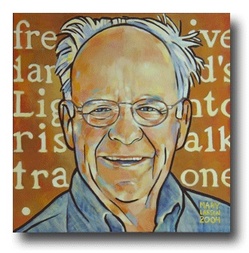 Today, Raymond Gerhardt Hunthausen, the emeritus archbishop of Seattle (1975-1991), celebrates his 91st birthday. He studied chemistry and later served as an assistant professor of Chemistry at Carroll College before becoming that school's president in 1957. In 1962, Blessed John XXIII appointed him as bishop of Helena and from there he attended all four sessions of the Second Vatican Council. at 40 years old, he was the youngest bishop at the beginning of the Council. In 1975, the Servant of God Paul VI appointed Bishop Hunthausen to the See of Seattle. Hence, he's been a priest for 66 years and a bishop for 50.
Today, Raymond Gerhardt Hunthausen, the emeritus archbishop of Seattle (1975-1991), celebrates his 91st birthday. He studied chemistry and later served as an assistant professor of Chemistry at Carroll College before becoming that school's president in 1957. In 1962, Blessed John XXIII appointed him as bishop of Helena and from there he attended all four sessions of the Second Vatican Council. at 40 years old, he was the youngest bishop at the beginning of the Council. In 1975, the Servant of God Paul VI appointed Bishop Hunthausen to the See of Seattle. Hence, he's been a priest for 66 years and a bishop for 50.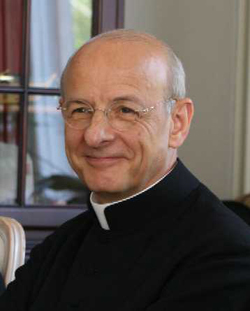
Fernando Ocáriz, 67, is the Vicar General of Opus Dei. He's a trained theologian in area of Dogmatics but he's also trained in physics. In 1986 he was appointed a consultor to the Congregation for the Doctrine of the Faith and later (1989) made a member of the Pontifical Theological Academy. Msgr. Ocáriz is the author of many books and refereed articles. He's one of the primary authors of Dominus Iesus. Of late Msgr. Ocáriz has been a theological consultant in the dialogue with the Society of St Pius X.
The following article is published in several languages by L'Osservatore Romano (2 December 2011).
On adhesion to the Second Vatican Council
The forthcoming 50th anniversary of the convocation of the Second Vatican Council (25 December 1961) is a cause for celebration, but also for renewed reflection on the reception and application of the Conciliar Documents.
Over and above the more directly practical aspects of this reception and application, both positive and negative, it seems appropriate also to recall the nature of the intellectual assent that is owed to the teachings of the Council. Although we are dealing here with a well-known doctrine, about which there is an extensive bibliography, it is nevertheless useful to review it in its essential points, given the persistence - also in public opinion - of misunderstandings regarding the continuity of some Conciliar teachings with previous teachings of the Church's Magisterium.
Pictures always tell a story, they're also worth a thousand words. OK, how much money would you give to preserve an archive of photography devoted to the Second Vatican Council? What is preserving photographic memories to such a legendary event like Vatican II worth to you? I hope much.
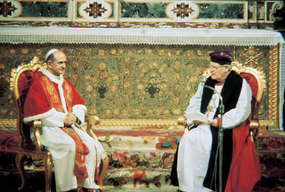
In 2009, Sister Leideke Galema, who managed Foyer Unitas for many years, gave Centro Pro Unione library a gift of 740 photographs taken at Vatican II. This precious collection not only records of the sessions of the Council, but also include important ecumenical moments from the pontificate of the Servant of God Pope Paul VI, including the historic meeting when he gave his own episcopal ring to the archbishop of Canterbury, Michael Ramsey.
Rome's Centro Pro Unione is a long time work of the Franciscan Friars of the Atonement dedicated to ecumenical action, research, and formation at the Piazza Navona. The Centro's mission is known through intensive programs, conferences, courses, and dialogues that attract theologians and academics from around the world. It's staff works closely with the Pontifical Council for Promoting Christian Unity and with various ecumenical leaders as well as teaching in the various theological faculties in Rome.
Foyer Unitas, a ministry of hospitality operated by the Ladies of Bethany, had since 1950 collaborated with the Centro in welcoming non-Catholic pilgrims arriving in Rome. During Vatican II, Pope Paul VI asked Foyer Unitas to provide lodging for the ecumenical observers. The Centro Pro Unione is working to make this collection available to the public during the 50 th anniversary of Vatican II's opening council in Rome later this year. To support the project and for more information visit the Friars' website.
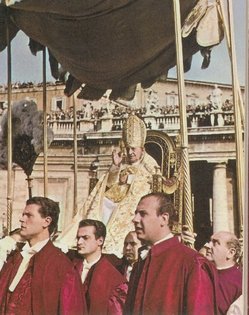 Today is the liturgical memorial of Blessed Pope John XXIII. It is an optional memorial on the liturgical calendar and so the memorial is left up to the discretion of the celebrant. But that today is Sunday, the prayers for his Mass are not prayed because Sunday takes precedence because it is a "Little Easter." Today also marks the anniversary of the opening of the Second Vatican Council.
Today is the liturgical memorial of Blessed Pope John XXIII. It is an optional memorial on the liturgical calendar and so the memorial is left up to the discretion of the celebrant. But that today is Sunday, the prayers for his Mass are not prayed because Sunday takes precedence because it is a "Little Easter." Today also marks the anniversary of the opening of the Second Vatican Council.
Everyone remembers the image of Pope John's smiling face and two outstretched arms embracing the whole world. How many people were won over by his simplicity of heart, combined with a broad experience of people and things! The breath of newness he brought certainly did not concern doctrine, but rather the way to explain it; his style of speaking and acting was new, as was his friendly approach to ordinary people and to the powerful of the world. It was in this spirit that he called the Second Vatican Ecumenical Council, thereby turning a new page in the Church's history Christians heard themselves called to proclaim the Gospel with renewed courage and greater attentiveness to the "signs" of the times. The Council was a truly prophetic insight of this elderly Pontiff who, even amid many difficulties, opened a season of hope for Christians and for humanity. In the last moments of his earthly life, he entrusted his testament to the Church: "What counts the most in life is blessed Jesus Christ, his holy Church, his Gospel, truth and goodness." (Pope John Paul II)
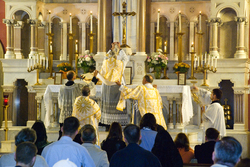 It is especially in the sacred liturgy that our union
with the heavenly Church is best realized; in the liturgy, through the
sacramental signs, the power of the Holy Spirit acts on us, and with community
rejoicing we celebrate together the praise of the divine majesty, when all
those of every tribe and tongue and people and nation (cf. Apoc. 5:9) who
have been redeemed by the blood of Christ and gathered together into one Church
glorify, in one common song of praise, the one and triune God. When, then, we
celebrate the Eucharistic sacrifice we are most closely united to the worship
of the heavenly Church; when in the fellowship of communion we honor and
remember the glorious Mary ever virgin, St. Joseph, the holy apostles and
martyrs and all the saints. (Lumen gentium, 48)
It is especially in the sacred liturgy that our union
with the heavenly Church is best realized; in the liturgy, through the
sacramental signs, the power of the Holy Spirit acts on us, and with community
rejoicing we celebrate together the praise of the divine majesty, when all
those of every tribe and tongue and people and nation (cf. Apoc. 5:9) who
have been redeemed by the blood of Christ and gathered together into one Church
glorify, in one common song of praise, the one and triune God. When, then, we
celebrate the Eucharistic sacrifice we are most closely united to the worship
of the heavenly Church; when in the fellowship of communion we honor and
remember the glorious Mary ever virgin, St. Joseph, the holy apostles and
martyrs and all the saints. (Lumen gentium, 48)
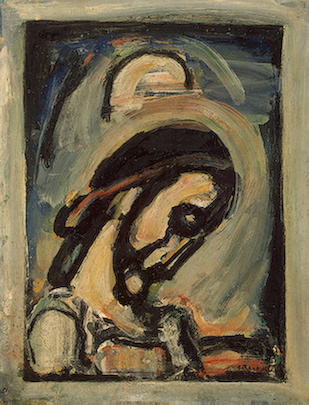 'God is love, and he who abides in love abides in God,
and God abides in him' (1 Jn 4:16). God has poured out his love in our hearts
through the Holy Spirit who has been given to us (cf. Rom 5:5); therefore the
first and most necessary gift is charity, by which we love God above all things
and our neighbor because of him. But if charity is to grow and fructify in the
soul like a good seed, each of the faithful must willingly hear the word of God
and carry out his will with deeds, with the help of his grace; he must
frequently partake of the sacraments, chiefly the Eucharist, and take part in
the liturgy; he must constantly apply himself to prayer, self-denial, active
brotherly service and the practice of all virtues. This is because love, as the
bond of perfection and fullness of the law (cf. Col 3:14; Rom 13:10),
governs, gives meaning to, and perfects all the means of sanctification. Hence the true disciple of Christ is marked by love both of God and of his
neighbor. (Lumen Gentium, 42)
'God is love, and he who abides in love abides in God,
and God abides in him' (1 Jn 4:16). God has poured out his love in our hearts
through the Holy Spirit who has been given to us (cf. Rom 5:5); therefore the
first and most necessary gift is charity, by which we love God above all things
and our neighbor because of him. But if charity is to grow and fructify in the
soul like a good seed, each of the faithful must willingly hear the word of God
and carry out his will with deeds, with the help of his grace; he must
frequently partake of the sacraments, chiefly the Eucharist, and take part in
the liturgy; he must constantly apply himself to prayer, self-denial, active
brotherly service and the practice of all virtues. This is because love, as the
bond of perfection and fullness of the law (cf. Col 3:14; Rom 13:10),
governs, gives meaning to, and perfects all the means of sanctification. Hence the true disciple of Christ is marked by love both of God and of his
neighbor. (Lumen Gentium, 42)
Jesuit Father Edward T. Oakes, a Mundelein Seminary Theology professor explains Pope Benedict's VERY clear reasons for putting to bed the ex communications of the SSPX bishops while delving into the acceptance of (or not) "Vatican II theology." What Vatican II said is a bone of contention of many, for a very long time....
You've got to read the article, Benedict's Vatican II Hermeneutic in First Things!
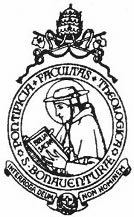 On October 28th, Pope Benedict wrote to Most Reverend Father Marco Tasca Minister General of the Friars Minor Conventual and Grand Chancellor of The Pontifical Theological Faculty of St Bonaventure Seraphicum on the occasion of an institute dealing with the theme of "The Second Vatican Council in the Pontificate of John Paul II." Here are a few relevant paragraphs from His Holiness:
On October 28th, Pope Benedict wrote to Most Reverend Father Marco Tasca Minister General of the Friars Minor Conventual and Grand Chancellor of The Pontifical Theological Faculty of St Bonaventure Seraphicum on the occasion of an institute dealing with the theme of "The Second Vatican Council in the Pontificate of John Paul II." Here are a few relevant paragraphs from His Holiness:
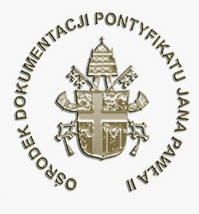 In practically all his documents, and especially in his decisions and his behaviour as Pontiff, John Paul II accepted the fundamental petitions of the Second Vatican Council, thus becoming a qualified interpreter and coherent witness of it. His constant concern was to make known to all the advantages that could stem from acceptance of the Conciliar vision, not only for the good of the Church but also for that of civil society itself and of the people working in it. "We have contracted a debt to the Holy Spirit", he said in his Reflection prior to the Angelus on 6 October 1985, referring to the extraordinary session of the Synod of Bishops which was about to be celebrated precisely in order to reflect on the Church's response during the 20 years that had passed since the conclusion of the Second Vatican Council. "We have contracted a debt to the Spirit of Christ.... This, in fact, is the Spirit who speaks to the Churches (cf. Rv 2: 7); during the Council and by means of it, his word has become particularly expressive and decisive for the Church" (ore, 14 October 1985, p. 12).
In practically all his documents, and especially in his decisions and his behaviour as Pontiff, John Paul II accepted the fundamental petitions of the Second Vatican Council, thus becoming a qualified interpreter and coherent witness of it. His constant concern was to make known to all the advantages that could stem from acceptance of the Conciliar vision, not only for the good of the Church but also for that of civil society itself and of the people working in it. "We have contracted a debt to the Holy Spirit", he said in his Reflection prior to the Angelus on 6 October 1985, referring to the extraordinary session of the Synod of Bishops which was about to be celebrated precisely in order to reflect on the Church's response during the 20 years that had passed since the conclusion of the Second Vatican Council. "We have contracted a debt to the Spirit of Christ.... This, in fact, is the Spirit who speaks to the Churches (cf. Rv 2: 7); during the Council and by means of it, his word has become particularly expressive and decisive for the Church" (ore, 14 October 1985, p. 12).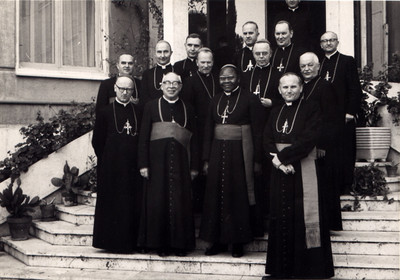 We are all truly indebted to him for this extraordinary ecclesial event. The multiple doctrinal legacy that we find in its Dogmatic Constitutions, Declarations and Decrees still stimulates us to deepen our knowledge of the Word of God in order to apply it to the Church in the present day, keeping clearly in mind the many needs of the men and women of the contemporary world who are extremely in need of knowing and experiencing the light of Christian hope. The Synod of Bishops that has just ended placed these needs at the centre of its own rich and fruitful reflections, reaffirming the hope expressed in the past by the Constitution Dei Verbum: "So may it come that, by the reading and study of the sacred books, "the Word of God may speed on and triumph' (2 Thes 3: 1), and the treasure of the Revelation entrusted to the Church may more and more fill the hearts of men" (n. 26), bringing them the salvation of God and with it authentic happiness.
We are all truly indebted to him for this extraordinary ecclesial event. The multiple doctrinal legacy that we find in its Dogmatic Constitutions, Declarations and Decrees still stimulates us to deepen our knowledge of the Word of God in order to apply it to the Church in the present day, keeping clearly in mind the many needs of the men and women of the contemporary world who are extremely in need of knowing and experiencing the light of Christian hope. The Synod of Bishops that has just ended placed these needs at the centre of its own rich and fruitful reflections, reaffirming the hope expressed in the past by the Constitution Dei Verbum: "So may it come that, by the reading and study of the sacred books, "the Word of God may speed on and triumph' (2 Thes 3: 1), and the treasure of the Revelation entrusted to the Church may more and more fill the hearts of men" (n. 26), bringing them the salvation of God and with it authentic happiness.This is a commitment that I am pleased to entrust in particular to you, dear Professors of the Pontifical Theological Faculty, who venerate the Seraphic Doctor St Bonaventure as its heavenly Patron. In the wealth of his thought, St Bonaventure can offer interpretative keys which are still up-to-date and with which you may approach the Conciliar Documents to seek in them satisfactory answers to the many questions of our time. The anxiety for humanity's salvation which motivated the Council Fathers, guiding their commitment in the search for solutions to the numerous problems of the day was equally alive in St Bonaventure's heart as he faced the hopes and anguish of the people of his own time. On the other hand, since the basic questions that man carries in his heart do not change with the changing of times, the answers the Seraphic Doctor attained have remained substantially applicable also in our day. In particular, the Itinerarium mentis in Deum that St Bonaventure composed in 1259 has remained valid. Although it is a guide to the heights of mystical theology, this precious little book also speaks to all Christians of what is essential in their lives. The ultimate goal of all our activities must be communion with the living God. Thus, for the Fathers of the Second Vatican Council too, the ultimate aim of all the individual aspects of the Church's renewal was to lead the faithful to the living God revealed in Jesus Christ.
The other day Bishop Patrick O'Donoghue of the Diocese of Lancaster, England, released a
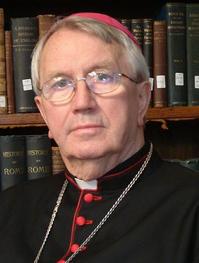 92-page document which is seen as highly critical of the Church in England since the Second Vatican Council. The Catholic Herald carries the story.
92-page document which is seen as highly critical of the Church in England since the Second Vatican Council. The Catholic Herald carries the story.
Several areas of concern are addressed by Bishop O'Donoghue: hope in Christ, Vatican II, Catholic identity, the work of the Trinity in our lives and in the Church, the role of the sacred. Liturgy, Divine Revelation's hold on us, dogma, and various other points concerning society and culture.
The bishop's document, "Fit for Mission?" seems insightful and is worth the time reading. The concerns that Bishop O'Donoghue has for the Church in his diocese, indeed for all of England are similar for those of us who live in North Americans. For that matter, they are the same concerns Monsignor Luigi Giussani had in the 1950's Italy and later articulated by Popes John Paul II and Benedict XVI. Namely, do you have a personal relationship with Christ, do you adhere to the objectivity of the Church, is faith a moralism or a way of knowing, living and loving, does your destiny really matter to you?
